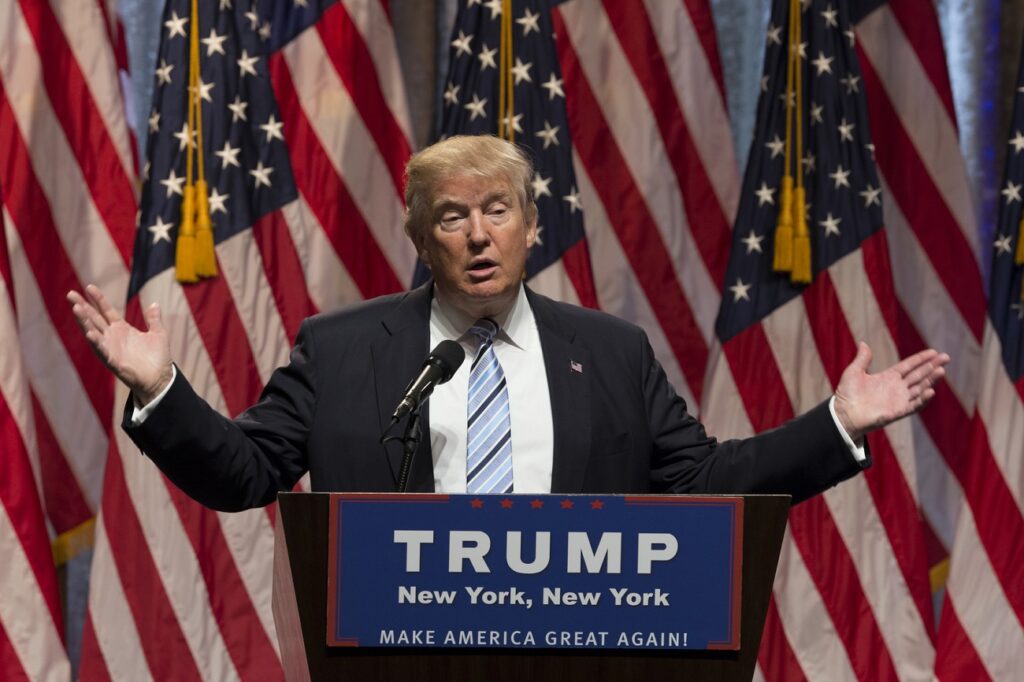Donald Trump is certainly a contentious figure. Increasingly I hear or read the perception that Mr Trump has low Emotional Intelligence (measured by EQ) yet, clearly, to be in the position he is, the man has ‘something’. I want to throw some light on this as it’s not quite as clear-cut as first seems. In fact, many people seem to be mistaking low empathy for overall low EQ.
EQ is a complex combination of personal emotional abilities or traits.
People increasingly acknowledge that high Emotional Intelligence is synonymous with great leadership and yet if Mr Trump has low EQ how is it that he seems to succeed? This is where detailed EQ analysis can be amazingly revealing.
So let’s have a peek, a guestimate at Donald Trump’s EQ based on my observation of news coverage.
It’s highly likely that Trump has a diverse range of Emotional Intelligence abilities. What matters with EQ is the balance and appropriateness of these abilities.
I’ve indicated below a theoretical scoring of Trump’s EQ components in order to show, arguably, how effectively they work for him.
In fact, many people seem to be mistaking low empathy for overall low EQ.
Low emotional awareness
Trump seems to have quite low engagement with his emotional realm.
What I mean is that he seems to have minimal emotional dialogue with himself and his feelings which means he frequently demonstrates poor judgement.
Receptivity is what we require to develop our self-understanding through life’s struggles and through our basic need to survive and Trump demonstrates low receptivity.
It’s possible he’s managed to get away with a seemingly ego-based way of being because his significant privilege and wealth mean he’s not had to worry or be challenged in the ways most of us are.
He often speaks slowly in a highly controlled way and puts his right-hand thumb and forefinger together to enforce his belief systems on others.
He’s not been pushed to understand himself and so adapt his arguably skewed sense of self-importance.
This has resulted in Trump failing to develop strong abilities to read people and situations. So Trump’s overall awareness is poor, as if locked into his own reality.
With such strong self-regard Trump’s able to retain his world-view and even effectively project his own version of reality by simply refusing to engage in an alternative.
He often speaks slowly in a highly controlled way and puts his right-hand thumb and forefinger together to enforce his belief systems on others, effectively saying ‘this is how it is – believe me”.
Trump seems neither to care nor be open to adapt his view to become more congruent with what may be commonly accepted.
In this presidential race Trump has become renowned for his numerous fictitious claims. He makes things up without demonstrating remorse.
He seems to have little idea of how others see him and because of his low empathy Trump seems neither to care nor be open to adapt his view to become more congruent with what may be commonly accepted.
This is typical of someone who, when growing up, did not need to care for others in order to survive, be accepted or thrive.
Emotional expression
Unsurprisingly, with his limited experience of emotions, Trump uses a minimal emotional vocabulary.
He has low emotional understanding and low emotional discernment. He focuses on strong negative emotions such as anger and fear in order to communicate and persuade.
When we are not able to understand and manage emotions comprehensively we tend to turn to strong beliefs and control mechanism (such as fear) to create rules by which to live.
He focuses on strong negative emotions such as anger and fear in order to communicate and persuade.
At best Trump may portray himself as a maverick but, ultimately, low emotional self-awareness and expression are fatal flaws to success and fulfilment no matter how much someone may pretend.
Trump repeatedly upsets people and particularly women and those of minority ethnicities.
He has encountered a string of poorly judged situations in his campaign. Some see Trump as impulsive. I don’t agree. I see this as more poor judgement and poor expression based on a poor awareness, therefore, poor ability to read situations and people twinned with low empathy.
Some see Trump as impulsive. I don’t agree. I see this as more poor judgement and poor expression.
Impulse control
Trump’s control of emotions seems high much of the time as he rarely demonstrates outbursts of uncontrolled emotion.
I’d say this is a strength as he gives the feeling to others of being in control of himself and unflappable. Indeed, how often do we see him show uncontrolled anger, upset or disappointment?
Trump’s control of emotions seems high much of the time as he rarely demonstrates outbursts of uncontrolled emotion.
He shows minimal emotional extremes. Trump’s way of being seems to be pegged within relatively narrow emotional boundaries.
He is quite deliberate. This gives him a low receptivity but because of his seemingly high stress tolerance he comes over as being calm and good under fire.
Lower authenticity
Owing to Trump’s low self-awareness yet high self-regard and impulse control, I suspect that what he shows on the surface and what he feels underneath may be quite divergent.
When this disparity shows itself we tend to feel this as a less authentic way of being.
Beliefs filter our reality and skew awareness.
I suspect that Trump’s strong beliefs govern his way of being rather than his freely accessing a ready supply of emotional information that would give him more appropriate, flexible and dynamic emotional responses in the moment.
Contrast him to Obama in this respect.
He seems to rely heavily on pre-prepared slogans and distracting hyperbole.
Beliefs filter our reality and skew awareness.
They also reflect back to the world thoughts and actions based on conditioning rather than the moment-to-moment working with full information and awareness. Beliefs take people out of the reality of the present moment.
This may be why Trump often looks stiff, disconnected, speaks slowly and takes so much time to construct sentences.
He seems to rely heavily on pre-prepared slogans and distracting hyperbole.
Authenticity looks much more fluid. Indeed, Trump’s experience as a TV personality and presenter means he will have a practiced habitual ‘screen presence’ which may not necessarily reflect who he is and what he’s truly thinking.
Those who read people well will not feel comfortable with Trump whereas those who don’t but want to believe in something and admire strength of personality will be drawn to him.
Very high self-regard
Mr Trump demonstrates that he thinks very highly of himself and anything that does not correlate with this belief is instantly disregarded.
No possibility is entertained that there may be some value to an alternate view.
There seems little chink in Trump’s ‘self-regard’ armour.
Trump shows very few signs of self-doubt, non-acceptance and guilt over poor judgement and mistakes.
He does not accept criticism and I would describe his self-image as ‘Teflon-like’ – some may say narcissistic.
Trump’s demonstrable absence of shame and guilt are his most worrying attributes because these are the emotions that help regulate decent social behaviour.
Without the emotions that regulate decent human behaviour a leader is dangerous. One who shows little care for people is not motivated by social conscience and altruism but by self-gratification.
Trump’s demonstrable absence of shame and guilt are his most worrying attributes.
Trump’s high self-regard and minimal guilt create an incredibly powerful way of being and, unhindered by the more challenging emotions many of his rivals face, Trump seems to go from strength to strength.
Guilt, for instance, can undermine purpose and self-regard and these qualities help to create magnetic personalities. There seems little chink in Trump’s self-regard armour.
High assertiveness with low empathy
Possibly one of the most significant combinations of EQ components relates to how Trump connects with people – he has very high assertiveness.
Trump does not seem to hold back on saying and doing exactly what he wants.
Mr Trump exhibits very low empathy. He seems not to notice or care about the feelings of others.
He’s been accused of being a sexual predator, he’s called for people to be thrown out of conventions and he speaks calmly about encouraging violence and supporting foreign powers to spy on US citizens.
Trump shows very little care about arousing aggression and creating potentially dangerous situations.
It is clear that his assertion levels are extremely high and yet for balanced relationships (leadership is a relationship) we require matching levels of empathy as the tempering force to balance such assertion. Trump does not have this temperance.
Mr Trump exhibits very low empathy. He seems not to notice or care about the feelings of others. He shows little remorse in hurting or offending people.
High self-actualisation acts like another accelerator for Trump’s self-motivation.
His views seem quite fixed and un-yielding re-enforcing the view of strong inflexible beliefs. I have rarely seen him show signs of sensitivity towards others or sincere curiosity and interest when listening to people.
Even when not speaking Trump does not look fully receptive and open, more often simply waiting to speak or act with his goals and views in mind.
This situation is exacerbated by his clear ambition and need to succeed.
This high self-actualisation acts like another accelerator for Trump’s self-motivation and drive which together with low empathy it appears that Trump’s drive will be at almost any cost.
The bombast and bully
Strong assertion and low empathy reflect a powerful bombastic quality that makes engaging with this type very difficult.
Such individuals can be bullies when they have high self-regard and low regard for others. Trump exhibits high independence – seemingly doing whatever he wants without any emotional dependence on others.
Trusting, enduring relationships are extremely difficult to build with such people.
Those who work with or follow these types tend to do so out of obligation, weakness and insecurity rather than on equal, respectful terms based on shared values.
Power from charismatic opportunism
Trump reflects a strong belief that the future is his – some may see this as optimism, I see it as an extension of his high self-regard – yet the future he projects about the world and the US seems dark, fearful and insular.
Trump motivates through his wide use of fear and fear-based language – ‘crooked Hillary’, ‘build a wall’, ‘taking your jobs’.
Trump’s rhetoric seems designed to create fear of his opponent, foreigners and others and yet he effectively says ‘believe in me’ believe in the USA’. This is the language of control; a classic psychological game of ‘persecutor/rescuer-victim’.
Trump motivates through his wide use of fear and fear-based language – ‘crooked Hillary’, ‘build a wall’, ‘taking your jobs’.
The persecutor creates fear, the rescuer says ‘only I can make the US great again’ while the victim hides behind un-founded accusations like ‘the electoral system is rigged against me.’
Either way he has carved himself a niche as a populist and is a significant opportunist in the political vacuum that exists; a vacuum of muddied human values, discontentment and few charismatic individuals in whom an electorate can believe.
Emotional intelligence is about balance
Coming from a process-change background, I sometimes like to think of emotional intelligence in terms of a system or process.
Trump, in essence, seems to have very high levels of drivers such as self-regard, assertion, ambition (self-actualisation), and independence. These are motivators.
Great leadership rests on one’s ability to know their true value and appreciate other’s value.
However he has far lower levels of emotional receptivity such as through emotional self-awareness, openness, , listening skills, awareness of others or of the wider world (reality testing).
Emotions are ultimately a feedback mechanism delivering messages to us in order to enable us to adapt to constant change.
Any system or person where the outputs significantly outweigh the inputs and where feedback and appropriate calibration with the outside world is minimised, eventually goes off –course.
One can but hope that the US has not elected Trump as captain of their ship when this happens.
Emotions are ultimately a feedback mechanism delivering messages to us in order to enable us to adapt to constant change.
Great leadership rests on one’s ability to know their true value and appreciate other’s value. This means having high self-awareness and empathy at their core.
Trump’s estimated EQ skills compared to an average adult male of his age

EQ-i®2.0 Descriptions – Emotional Intelligence components

The EQ-i 2.0 ® model that this analysis is based on is a psychometrically approved emotional intelligence assessment used by developmental experts to identify and build competencies for success and fulfilment in life and work. It is used under license by Philip Gimmack of EQworks and owned by mhs ltd. This analysis is this writer’s personal view only and is not related to any actual EQ-i® taken.











2 Responses
Thanks this Rainbow 🙂
Thanks for this Rainbow 🙂
I actually wrote the article a while before it was published.
Good question. I would only change a few minor things and other bits people argue with me on regularly I would hold fast.
Where I hold fast on:
1) Some people say he has empathy for ‘his’ people, at his rallies, so should score higher here. I say no. This is not empathy because he doesn’t exhibit caring and compassion in his way of being regardless of who he is engaging with. An empathetic nature is shown in one’s tone, body language, words, mood, behaviours; specifically the attributes that make up my social EQ model – http://www.artofempathy.co.uk.
2) The most common thing i hear about this analysis is that he has poor impulse control as he tweets day and night and seemingly from the hip. Again I hold my original view, as he does not appear spontaneous or impulsive. He is very controlled in nature (watch the tight lip facial cue he uses alot to stop himself saying something) and s stiff (inflexible) in how he approaches things, speaks, moves and gestures. His tweets are about having a thin skin – a thin ego. This is why my model of EQ goes beyond the EQ-i 2.0 used here. The self-regard the EQ-i uses is too broad a measure of self. Trump has very high projected self-belief but I actually believe quite low self-regard in some ways. This is a key way I would change my initial analysis. He has an overblown and quite sensitive ego.
Either way it’s interesting to see how his unique eq skills are playing out.
I read with great interest,
I read with great interest, your analysis of Trump’s EQ. Trumps’ rhetoric now often includes him saying he’s a genius, the smartest president ever. For that reason, I searched for and found your analysis. My career spans over 40 years in the field of employment, HR, Labour Relations and Community Develoment, retiring as CEO of a Workforce Develoment Board. I am firmly in the camp of those who believe EQ “trumps” IQ every time (sorry for the pun).
Since he was elected, and has been President for about 2 years, and since EQ is a process, I am wondering your assessment of his EQ now, is changed from 2016.